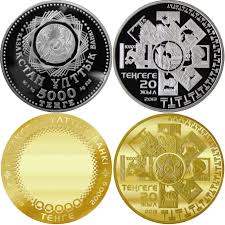 ALMATY – The 20th anniversary of the introduction of Kazakhstan’s national currency was celebrated at an international conference in Almaty attended by Kazakh politicians and representatives of the national and global financial sector.
ALMATY – The 20th anniversary of the introduction of Kazakhstan’s national currency was celebrated at an international conference in Almaty attended by Kazakh politicians and representatives of the national and global financial sector.
“The introduction of our own currency in 1993 has become the most important factor in the success of Kazakhstan’s financial system,” Kairat Kelimbetov, head of the National Bank of Kazakhstan, said while opening the conference on Nov. 15. Replacing Russia’s ruble, the tenge came into being with the presidential decree on the introduction of the national currency on Nov. 12, 1993.
According to Kelimbetov, the country’s considerable progress in transforming its economy and financial system has been achieved thanks to President Nursultan Nazarbayev’s leadership and his successful policies.
Since the beginning of this year, Kazakhstan’s overall international reserves have increased by 7.3 percent to an estimated US$92.4 billion, including US$68.7 billion as the National Fund assets. Deposit banks’ funds are growing steadily, indicating confidence in the banking system. Inflation has fallen to 4.9 percent at the moment and is expected to be at 6 percent by the end of this year
“Without our national currency, it would be impossible not only to maintain an independent economic policy, but also to determine our own way of development, to hold real sovereignty as well as protect national and economic interests,” the national bank head said.
“Over not a long period of existence, our currency has overcome serious challenges. But despite the challenges, our economic model has proven itself time after time. Despite the challenges, our economic model has proven its independence. At the times of acute crises, the reserve of sustainability in our economy and our literate macroeconomic policy helped us avoid negative growth rates,” Kelimbetov added.
The role of central banks in ensuring sustainable economic development has expanded significantly and the functions expected of them are changing. Monetary measures to stimulate the economy through the additional issue of money are now prevalent and the economies of many developed countries, including the U.S. and the countries of the eurozone, are in difficult conditions. Their productivity has decreased and the massive infusion of “cheap” money into their economies is almost the only means of maintaining demand.
Recently, the debate about whether Kazakhstan should go the way of these developed countries and use methods of monetary stimulation has intensified. Mechanisms for using the National Fund and revising the mandate of the National Bank have been suggested. Securing long-term funding from state resources has been the only idea discussed in the business community, Kelimbetov said.
“However, there is still no clear understanding of the effectiveness of these latest trends,” he added. “It is necessary to determine how the approaches being implemented in developed countries would be acceptable from the point of view of long-term sustainability and the risk of inflation. At this stage, the National Bank plans to continue to stick to its main objective, price stability, and thus maintain the value of the national currency for the population.”
The National Bank will continue to manage short-term liquidity with flexibility and strive to create the necessary indirect mechanisms for long-term financing, he said.
Kazakhstan quickly became the first country in the Commonwealth of Independent States to move to an accumulated pension system. Its pension model, which has been reformed in recent months, is intended to be a tool of social policy and to help promote the development of the country’s financial sector. The population’s pension savings are 3.6 billion tenge (11.2 percent of GDP). There are now more than 8.5 million individual pension accounts in the country.
“The tenge is one of the most secure currencies in the world. The National Bank is constantly working to improve the design of the banknotes, use advanced technologies, strengthen security features and exchange experience with leading foreign countries. Today, we can sincerely say that the introduction of the national currency was a necessary step on the way to statehood, strengthening our sovereignty and building a successful national model of economic development,” Kelimbetov said.
Representatives of global financial organisations, including the International Monetary Fund and the European Bank for Reconstruction and Development, as well as Kazakh politicians, bankers, experts and others attended the conference, where current issues in Kazakhstan’s financial system and the prospects of banknote production in Kazakhstan were discussed along with global stock market trends. In the evening, a commemorative medal to mark the 20th anniversary of the introduction of the tenge was approved.
A number of employees of the National Bank were awarded a Tengege 20 Zhyl commemorative medal (Kazakh for “20 years of tenge”) and the title of Honored Worker of the National Bank of the Republic of Kazakhstan.

